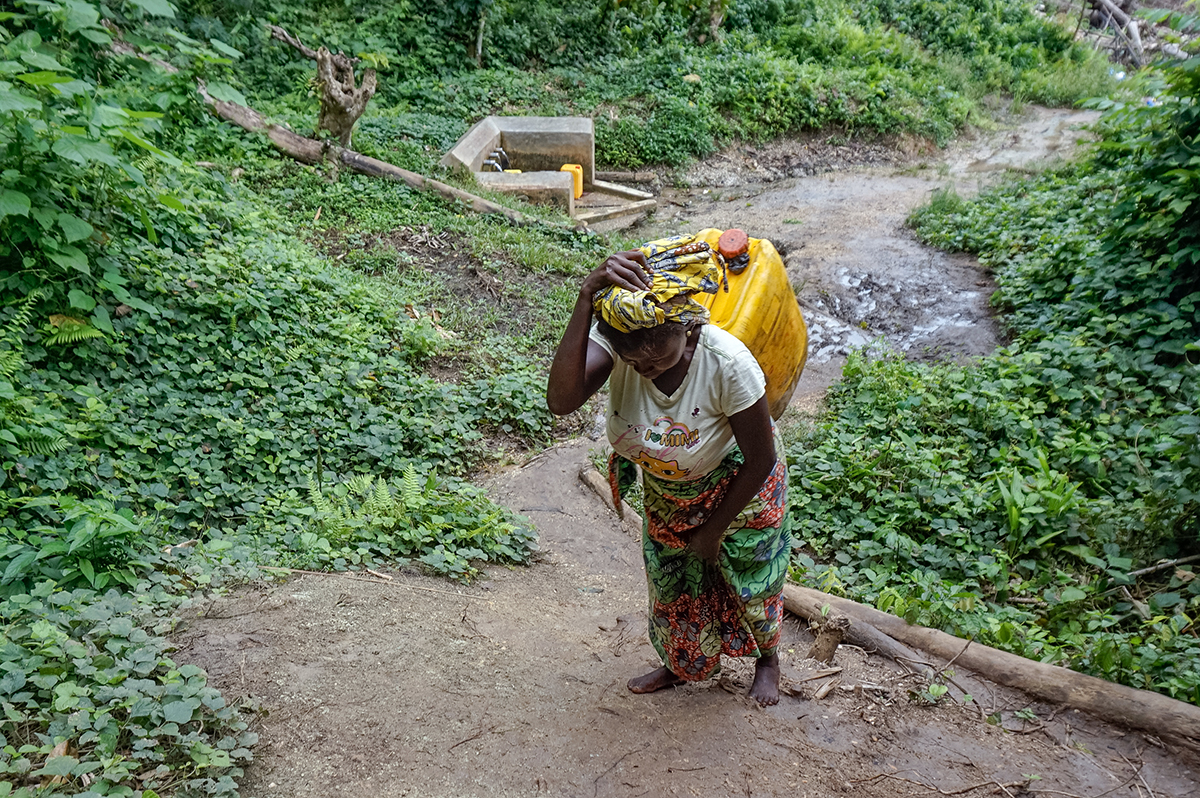
Zita Amwanga, GPJ DRC
The Madula community of about 40,000 people near Kisangani, DRC relies on a single developed spring that is located at the end of a steep dirt trail, pictured here. The trail turns slick and muddy during the rainy season, but people who rely on it say it’s the only place to get clean water.
KISANGANI, DEMOCRATIC REPUBLIC OF CONGO — Cathy Ekili, 51, descends a steep, slippery trail leading to a spring with a 25-liter jerry can strapped to her back.
“I’ve to walk down this hill every day to fetch water from this spring,” she says. “Well, to be honest, we’re experiencing the worst suffering of our life.”
She’s not alone. In Madula, the administrative center of Bakumu Mandobe sector located about 23 kilometers (14 miles) from Kisangani, all of the roughly 40,000 residents are looking for water sources. Many of them wind up spending hours each day walking to and from a spring, lugging water to their homes or businesses.
Now, at the height of the rainy season, trails to the spring are muddy and slick, making the chore even more difficult.
“It’s unbearable,” Ekili says.



Kisangani, a city in DRC’s central region, and its environs are growing rapidly. The city’s population doubled between 2000 and 2018, going from nearly 590,000 to 1.1 million. The city is projected to hit 1.9 million people by 2030.
Madula is growing too, but the only drinking water source for its increasing population is the spring where Ekili goes, which was developed by a program called Village Assaini in 2015. (Before that, people in the area used non-treated well water.) Ironically, the spring is located just a few miles from the Régie de Distribution d’Eau, DRC’s public sector water distribution company.
A single spring usually serves about 500 households, says Richard Florentine Azelito Payo-Saka, a provincial inspector of rural development. Developing a spring can cost $9,000, he says.
The national government must either develop more natural springs or drill boreholes, says Pierre Bondo Bin-Amundala, who leads the Madula sector. Members of parliament must make it a priority, he says.
Ekili’s only other option is to pay someone to supply water to her house at a rate of 2,000 Congolese francs ($1.23).
“That’s no mean feat, because I’m a dead broke widow,” she says.



Love Ngomba, who operates an informal restaurant in Madula, says she spends between 3,000 and 4,000 Congolese francs ($1.84 and $2.45) each day to pay people to bring her water. It’s necessary for her business to run.
“I get water without too much trouble,” she says.
The situation has indeed created a job opportunity for people looking for work.
Jean Bangala earns money by fetching water for people like Ngomba. “I can’t help but rejoice because it helps me make some money and support my family,” he says. “You know, everything happens for a reason, because with water shortages, I can afford to eke out a living.”
Ndahayo Sylvestre, GPJ, translated the article from French.







